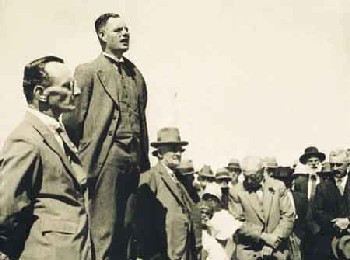
CONCLUSION
John Curtin was just beginning his working life as Australia became a Federated nation. Despite moving away from his Irish Catholic background, he was evidently influenced by it and by the poverty of his upbringing to realise that Australia was not an equal society, and that the major task of a national government was to govern for the good of all the people. In Australia, such a task was possible only when one administration governed the whole nation and created 'uniformity where uniformity is necessary or desirable', while recognising that the State governments also had a role to play. While living in Western Australia, he developed a realisation that Federation disadvantaged some states. He believed that some of these weaknesses occurred because the Constitution had not been followed closely enough. He never lost his faith in the spirit and intention of Federation. When in office, he passed legislation to correct many of the existing anomalies in social welfare provision. He attempted to gain greater Federal powers to enable more efficient post-war development.

John Curtin Prime Ministerial Library. Records of the Curtin family. John Curtin speaking at opening of South Beach, Fremantle, c.1930s. JCPML00376/160
Curtin was a true patriot although he eschewed 'jingoism'. He loved Australia, but was acutely aware of the existing social and economic inequality. He was outraged by injustice - particularly by the suffering of children whose parents could not adequately provide for them - and was scathing in his denunciation of the myth that Australia was a 'workers' paradise'. Curtin believed passionately that Australians should stand up for themselves and be a nation in their own right. This included throwing off the yoke of foreign debt. He admired Canada for its independent stance within the Empire and obviously believed that Australia should do likewise. He loathed Imperialism and all its trappings, although later in life he stated that Empires created political stability in the international scene, and in his last years, he seemed over-anxious to show the world that Australia was still 'British'.
Although he had abandoned ritualised religion at an early age, Curtin remained a spiritual person with an understanding of and a respect for Christian teaching. He believed that true Christianity showed itself in works that benefited fellow human beings and brought equality and expressed 'brotherhood'.
For much of his life, Curtin worked to uplift and empower the poorest sections of society - low wage earners and pensioners. He believed that a person could fully contribute as a citizen only when he or she was adequately remunerated, educated and housed. Furthermore, all should have the same opportunities. But he also saw citizenship as containing responsibilities, particularly so in wartime when the nation was under threat. In October 1944, he addressed school children in Fremantle on the subject of 'the ideals of citizenship', telling them always to strive to build 'a bigger and better Australia' - although size was not everything. He reminded his audience that Japan had a bigger population than Australia 'but this did not make them better or as good as the Australians.' (Day, p. 554). Clearly, Curtin believed strongly in the concept of 'duty' as revealed in his determination to 'see it through' even when he was too ill to carry out his duties as prime minister.
Curtin has been an inspiration to his successors in the Labor movement. He has been credited, above all, with making Australia into a unified, independent nation at its time of greatest peril.